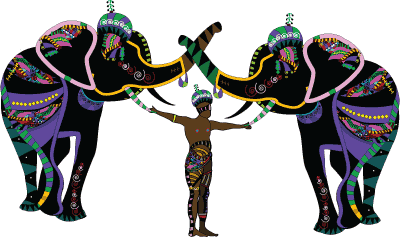This is the conclusion to the article that began in the August issue of Agency Sales.
The chairman was now a little impatient. He said with some conviction, “We’re running out of time. We’ve beaten the elephant issue to death. We are going to track numbers for the rest of our business careers — that is inherent to being a president. If numbers have no meaning — yet it is important that our people find meaning in the numbers; how do we make that happen?”
“Sir, that is a great question — and I totally agree with the reality that numbers must have meaning. Let me orchestrate three ways to make that happen.”
The first way is to merely ask everyone to consider the magnitude of a number. Let me challenge you with an example.”
I asked them to pick up their pens and gave them the following facts. “I recently weighed 1,000 one dollar bills and they weighed two pounds. Therefore, how much does a trillion one dollar bills weigh?”
Most of them just looked at me with a blank stare. After 10 seconds, I said, “Freeze! Don’t move — look at yourselves — you are like the elephants, thinking it is not your job to figure this out, and if you wait, someone will do it.
Challenge Thinking
Remember that your people, as a total group, have not been challenged to think about the magnitude of your business.”
They could all feel the challenge and their own willingness to let someone else do the thinking.
I said, “We aren’t going forward until everyone has the answer. When you get it, cover it up and encourage those who don’t have the answer to figure it out — and if they need help, simply raise their hand.”
They began to work and within a minute Russ had the answer. I motioned for him to wait for the rest of the group. I cautiously talked while they were working. “We can only go as fast as the slowest person — if you are in need of help, raise your hand.”
Six hands went up. “Russ, it is now okay for you to help anyone that needs help.”
In a few minutes everyone had the answer. They were stunned that a trillion one dollar bills would weigh one million tons. I asked them, “Does that give meaning to the magnitude of our economy?”
They wanted to debate the political scene, so I interrupted and said, “We aren’t finished. There is more to understand about the magnitude of a trillion. If you had to transport the one trillion one dollar bills on trucks at 20 tons per truck, how many trucks would be required?”
By now they were not willing to wait on the total group and Carlos said, “50 thousand trucks!”
Once they got over the magnitude of a trillion, I said. “Russ and Carlos, both of you got the answers before the rest of the group and wanted to tell them the answers. That is the second aspect of orchestrating meaning of numbers — we must be patient and teach people to think.”
I paused, “If you want to be a $100-million dollar company or have a 100 percent order fulfillment rate, the people need to understand the magnitude — not just be told the magnitude of $100 million. Adults don’t learn by being told — they must be challenged to define the process of attaining those objectives. It is easy for them to assume that someone knows and merely do their job.”
The chairman said in a rhetorical way, “This sounds like what we do in strategic planning. Do you mean that everyone must be involved in strategic planning?”
Strategic Visioning
I said, “It’s called strategic visioning in that it is done on a daily basis rather than at an off-site strategic planning retreat. It’s the first step of visualization in the visualize, enroll and align leadership process.”
I paused as they were consumed with new awareness. “In the new business environment it is critical that everyone be asked to get involved in understanding the meaning of the economics of the business on a daily basis.”
The chairman quietly said, “It’s that total group game thing — right?
“Sir — running any business or organization is a total group game. As leaders, we cannot expect to have the business run in an effortless and effective way if only a few people understand the numbers that drive the business. Everyone must be enrolled in understanding the meaning and magnitude of the numbers and how their work personally impacts those numbers.”
“More important than the economics — and here is the most difficult leadership assignment — you must only go as fast as the slowest person. There are legitimate excuses for functional people to avoid the discussions about the meaning of the business — because they are too busy driving 80 in the fast lane.”
Cheryl raised her hand and asked, “Give me a very practical example of how we can use this tomorrow in our business — what triggers me to think that I can put people through this kind of agony.”
“Cheryl, in the beginning it is agony because people are busy — so we need to discuss how and when to implement the process. But, a very practical example might be when one of your sales reps says he lost an order because the price of your quote was too high? Orders are never lost because the price was too high. They are lost because the salesperson didn’t understand the meaning of the number called the price.”
There was silence as everyone knew the magnitude of this assignment. “Therefore, the key leader skill is to orchestrate meaning — in everyone — and it leads to the third step in the leadership model — orchestrating alignment within the organization to serve customers in real time.”
Brian had been very engaged by the trillion-dollar question. He asked. “You said there was a third way of orchestrating meaning of numbers. Can you tell us what it is?”
“Brian, the third way is to engage your customers who you might call partners in the meaning and magnitude of the numbers — especially where the money is a joint investment between two legally independent organizations — yet two financially interdependent entities. It is how any mass customized business must operate.”
Russ said, “We call our reps our business partners. I held a market share meeting with our reps a month ago and the reps all looked at me like they were elephants. The pie charts and market share percentages were meaningless. How do I fix that problem?”
Jean could not hold back and said, “Russ, that is not a problem to fix — you must start by seeing the reps as people, not as a cost to be controlled or as a market share to be achieved.”
Jean’s frustration with the elephant trainer approach was beginning to show, so I intervened and said, “Gentlemen, there is never a good time to admit that we have an enormous challenge to our “smarts” yet ahead. The future will be full of very different ways to do things that are totally different from how they’ve been done in the past. This will make you feel very vulnerable — but people will ultimately judge you based on the energy field of meaning that you are able to generate.”
Leaving the Nest
Jean looked at the chairman and quietly said, “Sir, this is the eagle’s secret. The mother eagle knows that her young have the potential to soar. All she has to do is push them out of the nest when it’s time. I think it is time that we trust that our people have the potential to soar and help them get over their fear of failure so they can experience the thrill of soaring.”
As we ended the day, I asked them to read the following quote by Dee Hock in their copy of One From Many:
“To be precise, one cannot speak of leaders who cause organizations to achieve superlative performance, for no one can cause it to happen. Leaders can only recognize and modify conditions that prevent it; perceive and articulate a sense of community, a vision of the future, a body of principles to which people are passionately committed, then encourage and enable them to discover and bring forth the extraordinary capabilities that lie trapped in everyone, struggling to get out. Without question, the most abundant, least expensive, most underutilized, and constantly abused resource in the world is human ingenuity. The source of that abuse is mechanistic, industrial age, dominator organization and the management practices they spawn.”
“I hope we can see from Joe’s e-mail — and from our own admissions — that we all have a similar inner voice that reflects the management mind of the Industrial Age business model. I further hope that you can sense that there are extraordinary capabilities that lie within your people.”
“Finally, never doubt that your people are being held hostage by their own inner voice and want you to change the way you see their potential. Yes, it will take a push to enable them to soar.”
The chairman said, “This will be an enormous challenge — way beyond driving ‘3’ and stopping the gimme putting. We will all need to think in a very different way.”



